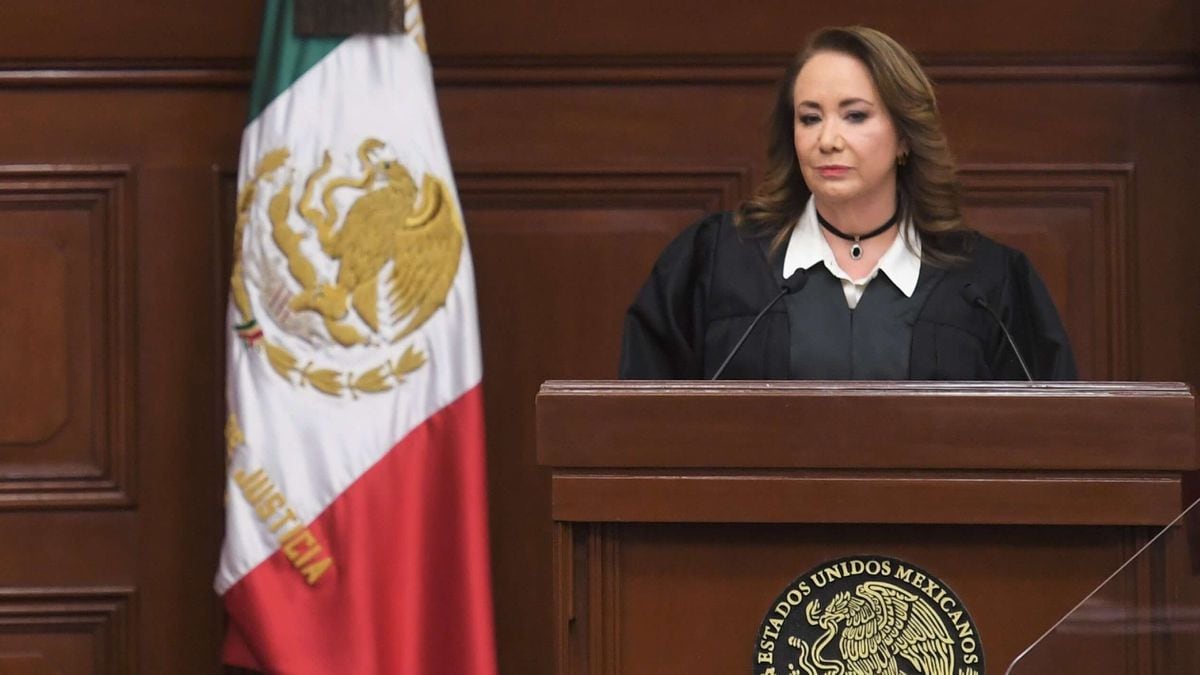An investigation by EL PAÍS has documented that the minister of the Supreme Court of Justice of Mexico, Yasmín Esquivel, plagiarized the thesis with which she obtained her PhD in Law from the Anahuac University in 2009. At least 209 of the 456 pages of his thesis
Fundamental rights in the Mexican legal system and its defense
They correspond to works previously published by 12 authors, including notable Mexican, Spanish, Italian and German jurists.
PAN senator Kenia López Rabadán has described the judge as a "repeat offender of intellectual theft", in reference to the accusations that Esquivel also plagiarized his degree thesis in 1987. The coordinator of Movimiento Ciudadano in the Chamber of Deputies, Jorge Álvarez Máynez, has said that the new revelations about academic plagiarism show a "difficult pattern to justify" and has asked Esquivel to present her resignation as minister so as not to further affect the Supreme Court.
The Anahuac University, a private school in Mexico, issued a statement Friday night in which it said that plagiarism is not punishable three years after the doctoral exam.
In defense of the minister, her lawyer, Alejandro Romano, has affirmed that "the possible existence of omissions in the author's citations, or of errors in their wording, only have that meaning —that of deficiencies or oversights—, but never a form of plagiarism”.
The lawyer has argued that, "technically", plagiarism implies publishing a "complete work" in the name of another person.
In addition, Romano has said that there are authors whose work is commonly used by law students and professors, so "it would be absurd to say that their work was plagiarized when their points of view are invoked."
Esquivel's lawyer pointed out that two Italian authors Luigi Ferrajoli and Maurizio Fioravanti would fall into this assumption, but did not mention the other 10 authors whose work was plagiarized, as EL PAÍS has documented.
Next,
The author most copied by Esquivel is Antonio Enrique Pérez Luño, a prolific 79-year-old Spanish jurist and philosopher.
In total, 55 pages of the minister's thesis come from transcriptions of two texts by the lawyer that were not cited: his essay "The foundations of human rights", published in 1983 in the Revista de Estudios Políticos (Nueva Época)
,
and the chapter “The role of Kant in the formation of human rights”, included in the work
History of fundamental rights
(Dykinson, 1998).
From this second text, Esquivel took, without citing, even the names that Pérez Luño gave to its subchapters: "Immanuel Kant and the culmination of enlightened humanism", "Kant and the rule of law", "Penal guarantees and human dignity", " Human rights as a concretion of the value of justice” and “Kant and the discovery of the universality of human rights”.
On the left side, the index of Esquivel's thesis;
of law, the index of the essay by Pérez Luño published in 'History of fundamental rights'. El País
From Luigi Ferrajoli —another of the most copied authors— he took practically an entire chapter of his book
Rights and guarantees: the law of the weakest
, which the 82-year-old Italian theorist titled “Fundamental Rights”.
Esquivel varied it a bit by calling it "Definition of Fundamental Rights."
The minister quoted Ferrajoli in two paragraphs, and then took 33 almost consecutive pages from her book, without referring to it.
From another Italian jurist, Maurizio Fioravanti (1955-2022), the judge copied the chapter "The three theoretical foundations of freedoms", which the author divided into subchapters, which the minister brought to her thesis with the same names: "The historicist model”, “The individualist model” and “The statist model”.
In this last case, as in several others throughout her thesis, the minister slightly changed the terms and, instead of "statist", she noted "statist".
Something similar she implemented in the case of the book
The Rights of Man
of José Castán Tobeñas, who was president of the Supreme Court of Spain.
Where the author titled "Human rights in their relationship with similar legal figures", Esquivel put: "Fundamental rights in relation to similar legal figures."
Other of the most obvious examples of plagiarism within Minister Esquivel's thesis can be found in the footnotes.
In the original texts, the authors make their own citations that they include at the bottom of the pages.
These are transferred by the judge directly to her doctoral work, as if she were the one who had consulted those works.
For this reason, the way of citing changes throughout the 456 pages of the thesis.
Thus, for example, on page 351, in its section on the legal foundations of the amparo trial, there is footnote 325 where it reads: "We deal with the concept of 'governed' in our work Las Garantías Individuales, chapter two" .
Esquivel did not write that book, but the prestigious Mexican constitutionalist Ignacio Burgoa Orihuela, whom she is transcribing.
Along the same lines, footnote 243, located on page 206, of Esquivel's thesis states: “See our article 'Subjective Rights', in the New Legal Encyclopedia, Barcelona, Seix, t.
VII, pp.
102 et seq.
This encyclopedia was published in Spain between 1950 and 1965. The minister was born in 1963. The former president of the Spanish Supreme Court, José Castán Tobeñas, who did make that footnote for the first chapter of his publication, did participate in its preparation. book 'The rights of man', in 1992.
Or, for example, in the section on the "Legal Nature of Fundamental Rights" of the minister's thesis there are a total of six footnotes on the German Constitution, several of which quote full articles and even read : “This is the position in German constitutional law, see RENGELING, Hans-W.:
Grundrechtsschultz in Der Europaischen Gemeinschaft, München
, 1992, p.
112, for Spain see also STC 53/1985 (FJ. 4.)”.
They are the same ones that appear in the chapter that the German jurist Rainer Arnold presents for the book
Rights in Europe
, coordinated by the National Distance Education University (UNED) of Spain in 1997.
On the left side, the minister's thesis;
on the right side, a page from the book 'Fundamental rights in Mexico' by the Mexican lawyer Miguel Carbonell.El País
In the bibliography, the work
Die Metaphysik Der Sitten
(1977) by Immanuel Kant is also cited in German, and in Italian,
Kant e le fue libertá
(1974) by Norberto Bobbio.
Those are the languages in which Antonio Enrique Pérez Luño consulted the books for his text "The role of Kant in the historical formation of human rights", published in 1998 in the History of
fundamental rights
.
EL PAÍS asked Minister Esquivel if she had consulted these works in their original languages, but received no response.
The Spanish lawyer José Manuel Rodríguez Uribes, another of the copied authors, has indicated that the magnitude of the plagiarism can be seen in the “details”.
He, who wrote the chapter "Rousseau and human rights" for the
History of Fundamental Rights
, included as a footnote an anecdote from the life of the French philosopher that he came across while doing his doctorate in the 1990s. Rodríguez Uribes wrote that when Rousseau presented his Discourses —one on the sciences and the arts and another on the origin and foundations of inequality between men-, had a contradictory luck: with the first he succeeds and becomes famous, with the second he fails, as the jury retires before finishing his reading.
“The consented extravagance of the first Discourse became impertinent with the second due to the explicit criticism, in this case, not of civilization and progress in general, but, more directly, of private property in particular, of the capitalist system
.
incipient”, Rodríguez Uribes wrote at the bottom of the page.
Dodge it, too.
subscribe here
to the
EL PAÍS México
newsletter and receive all the key information on current affairs in this country


/cloudfront-eu-central-1.images.arcpublishing.com/prisa/ZMRP4MAVAJFR5F74GQ7A2H2MA4.jpg)
/cloudfront-eu-central-1.images.arcpublishing.com/prisa/5DVWGWV2YVBJXKT7LKXMVHXHTE.jpg)


/cloudfront-eu-central-1.images.arcpublishing.com/prisa/DGAXPTVHVNGTDKDEMOMYHMEFHI.jpg)


/cloudfront-eu-central-1.images.arcpublishing.com/prisa/W7IQF4C7SNGWPISPIMSYTSYPBU.jpg)





